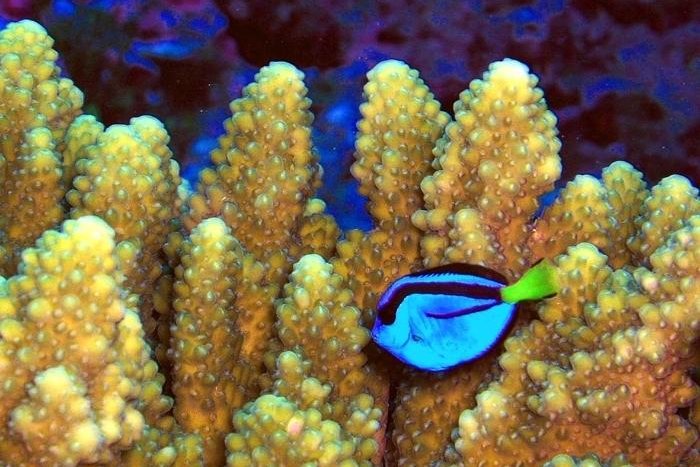A coral reef fish also known as a Pacific blue tang swims along a crop of Acropora coral in the Pacific Remote Islands National Wildlife Monument. (Jim Maragos/USFWS)
VANCOUVER, British Columbia, Oct. 10 (UPI) -- Just as Manhattan was a decade ago, and Brooklyn is now, the tropics are so "over." It's not that the tropics are no longer cool or hip; they're getting too hot.
According to new research, fish are moving poleward in search of cooler, better oxygenated water -- water with healthier habitat and more food to eat. And it's not just a fad or an overreaction to the rising price of prime coral-side real estate; it's a trend that's picking up steam in a hurry and isn't likely to slow down. In fact, scientists at the University of British Columbia say the tropics will be fish-less by 2050.
Adopting the global warming projections calculated in the most recent report from the Intergovernmental Panel on Climate Change, scientists at UBC developed models to predict the large-scale shift of marine fish and invertebrates over the next several decades.
If the climatologists' worst-case scenario comes true, and the oceans get three degrees warmer, fish will move toward the poles at an average pace of 16 miles per decade. A best-case scenario of only a single degree increase in ocean temps would see fish moving poleward at nine miles per decade.
"The tropics will be the overall losers," study co-author William Cheung, associate professor at the UBC Fisheries Center, said in a press release. "This area has a high dependence on fish for food, diet and nutrition. We'll see a loss of fish populations that are important to the fisheries and communities in these regions."
Cheng and his colleagues built their statistical models using yearly catch data, which helped explain how fish have reacted to temperature changes since 1970.
"As fish move to cooler waters, this generates new opportunities for fisheries in the Arctic," said lead study author Miranda Jones, a UBC Nereus Fellow. "On the other hand it means it could disrupt the species that live there now and increase competition for resources."
The work of Cheng and Jones was published Friday in the ICES Journal of Marine Science.















